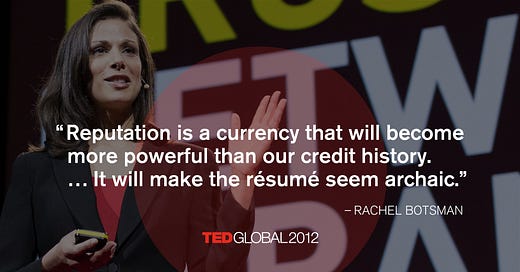Why trustworthiness trumps reputation
Rethinking Reputation: How I respond when asked a question about managing reputation
Rethink with Rachel is a reader-supported publication. To receive special content and support the work that goes into this newsletter, please become a paid subscriber.
Dear Rethinkers,
If someone asked you for three words to sum up your reputation, what would you say? This is the question I asked the audience when I gave a TED Talk way back in 2012. On re…
Keep reading with a 7-day free trial
Subscribe to Rethink with Rachel to keep reading this post and get 7 days of free access to the full post archives.




